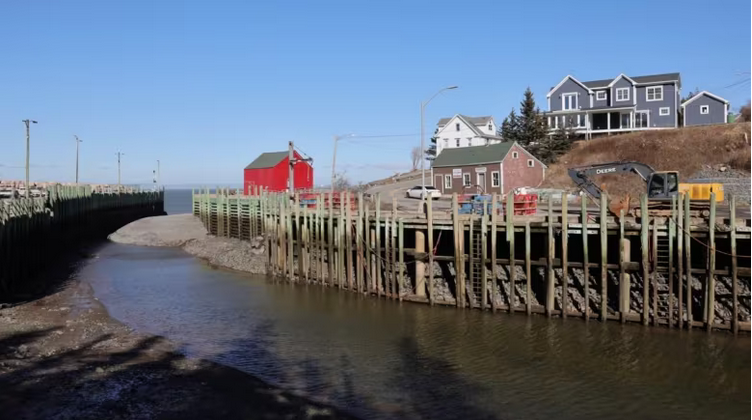Although it isn't quite summer yet, blue-green algae, also known as cyanobacteria, is already showing up in New Brunswick waterways. Meghann Bruce, a researcher and instructor with the University of New Brunswick Canadian Rivers Institute, said as soon as the ice went out in early May, there was a "bloom" in Blue Bell Lake near Grand Falls.
Nature Conservancy of Canada touts plan to protect 5,000 square km of Prairie grasslands
"They provide a lot of what we call ecosystem services," he said. "So, they provide a lot of benefit to everyday Canadians' lives, even if you don't live or work in the grasslands." They store and filter water, preventing both floods and droughts. They improve water quality. They keep soil in place, because of extensive root networks, so there's less erosion along lakes and rivers.
World Water Day marked with funding announcement for research and protection of our most precious natural resource: fresh water
We are taking advantage of World Water Day to support our ambitious climate change actions that keep our air and our fresh water clean. Already, the Government of Canada has committed to create a Canadian Water Agency to protect this natural resource, which provides us with clean drinking water, transportation, energy, and economic opportunities, as well as recreation. Parliamentary Secretary Terry Duguid is also attending the United Nations Water 2023 Conference in New York this week as Canada's representative to discuss the mid-term review of the goals of the International Decade for Action on Water for Sustainable Development, 2018–2028.
N.S. oceanside hamlet bands together to protect itself from climate change
Hope Shanks has seen more than her fair share of the effects of climate change. At least once a year, the bookkeeper for the restaurant and shop in Halls Harbour, N.S., has to help clean up after water from the Bay of Fundy breaches the seawall, sweeps across the parking lot and floods the restaurant. Most recently, on Christmas Eve, the Halls Harbour Lobster Pound was inundated with more than a metre of water.
Teck Metals Ltd. ordered to pay a $2.2 million fine for unlawful deposit of effluent into the Columbia River
Canadians value clean water and a sustainable environment. Environment and Climate Change Canada enforcement officers strive to ensure that businesses and individuals comply with laws and regulations that protect Canada's natural environment. On January 10, 2023, in the Provincial Court of British Columbia, Teck Metals Ltd. was ordered to pay a total of $2.2 million after earlier pleading guilty to two charges laid under the federal Fisheries Act and one charge laid under the provincial Environmental Management Act. The charges stem from a 2019 release of effluent into the Columbia River. The federal fine of $2 million will be directed to the Government of Canada's Environmental Damages Fund. In relation to the provincial charges, Teck Metal Ltd. was ordered to pay a total fine of $200,000.
Nova Scotia's provincial parks aren't as protected as you may think
Nadine Hunt's love for nature started early. As a child, she and her mother would often go to the beach near their home in Mabou, Cape Breton. "She taught me to respect the beach. If there was any litter or garbage around, we were picking it up," she said. Hunt said the area's unique natural environment and peaceful atmosphere are what makes it so special. "It's not just the beautiful beach and the warm water that we experience here in the summertime, but also the fact that you can always find a spot to be by yourself," she said.
Great Bear Lake agreement gives 'us the ability to actually sit at the table, says Délįnę chief
The Délįnę Got'įnę government and its federal and territorial counterparts have agreed on further protection for Great Bear Lake or TsáTué, a UNESCO-recognized biosphere reserve. The new agreement will enhance conservation of the area and will lead to long-term funding. It also formally recognizes the Sahtugot'ine's millennia-long stewardship in the Northwest Territories region. "It's a step in the right direction," said Danny Gaudet, the Délįnę Got'įnę government's Ɂek'wahtı̨dǝ́ or chief. "It's finally given us the ability to actually sit at the table to talk about the preservation of water, the lake, and the water bed and the land in and around Great Bear Lake."
Why many Canadians' homes aren’t protected against the threats of extreme weather
The past couple of years has shown us that extreme weather events — from devastating floods to extreme heat — are becoming the norm. But even in light of this and amidst a summer of sun and storms, many Canadians’ homes aren’t protected from the very real threat this kind of now-to-be-expected weather poses. According to Vice President of Claims at TD Insurance, Craig Richardson, a survey of Canadian homeowners conducted by TD Insurance in 2022 revealed that “just over half of Canadians (51%) either don’t have extended water damage coverage or don’t know if they have coverage, yet one in five Canadians have experienced water damage to their homes.”
New Brunswick announces the protection of another 100,000 hectares of land and water
The New Brunswick government said Thursday it will protect another 100,000 hectares of land, as part of its commitment to double the amount of protected land and water in the province. The new designation would permit hiking, camping and hunting in the protected areas but restrict activities such as timber harvesting, mining and quarrying, Natural Resources Minister Mike Holland told reporters. “Land doesn’t protect itself and forests don’t conserve themselves — they need a voice,” Holland said.
Islanders may have hard time finding storm surge insurance as climate change risks rise
Islanders looking toward a future of more frequent extreme weather events may not be able to find the protection they need through insurers just yet. A report released last month said that by 2050, the province will see significantly more severe weather conditions due to climate change. The report said there will be increased risk of coastal erosion, heat waves, heavy rain, flooding, severe ice storms and droughts.
Wade in the water
Look closely at our history, culture, and lore, and you’ll find water at its heart. We are nestled between three oceans, and enjoy our lakes, rivers, and ponds year-round. And while we are raised in, on, and around it, recent years have hammered home the billions of reasons why we can’t ever take water for granted. A full 20 percent of the world’s freshwater lives here. Only about seven percent of it is renewable―coming into our rivers and lakes from rain and snowmelt―and climate change warnings have made clear that it is at risk. A recent UN report on climate change paints a grim picture globally of higher temperatures, extreme drought, and rising sea levels. And Canada isn’t immune—on June 29th this year, British Columbia recorded its hottest temperature in history. In fact, as Canada is warming on average at twice the rate as the rest of the world, its global role in water conservation is more important than ever.
Indigenous activist Autumn Peltier vows to hold feds accountable for 61 boil water advisories
With tears in her eyes, Peltier has also pressed Prime Minister Justin Trudeau directly about the ongoing threat that oil pipelines pose to the environment, specifically clean drinking water. “I’m kind of still holding him accountable because I’m not going to forget that,” she said. “When you think about Canada, you don’t imagine having a crisis or issue this big because we’re looked at as a rich country." The Trudeau government promised to end all long-term water boil advisories on First Nations reserves by March 2021. As of last March, 88 were lifted, but 61 still remain. Even through the pandemic, Peltier’s activism hasn’t stopped. Along with completing her school work, she’s also been empowering other youth through online events and speaking engagements.
Water shortages and yearly floods: Canada won’t escape climate crisis, UN report says
Damage to Earth’s oceans and glaciers from climate change is outpacing the ability of governments to protect them, a new report from an international scientific panel concludes. “The capacity of governance systems in polar and ocean regions to respond to climate change impacts has strengthened recently,” says the Intergovernmental Panel on Climate Change. “But this development is not sufficiently rapid or robust to adequately address the scale of increasing projected risks.”














